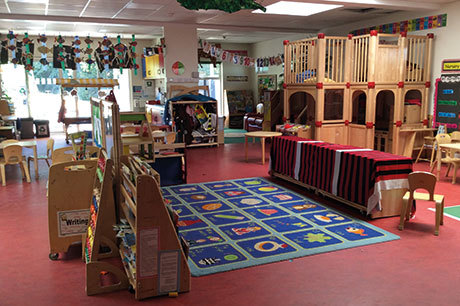
 In 1998, Sandra Campbell (right) became head teacher at Church Hill Nursery School in Walthamstow. Then, in 2013, she was asked to also take on the headship of another local nursery school, Low Hall. Although initially appointed on an interim basis, it soon became clear that she would be asked to continue as joint head, chiefly due to budget pressures.
In 1998, Sandra Campbell (right) became head teacher at Church Hill Nursery School in Walthamstow. Then, in 2013, she was asked to also take on the headship of another local nursery school, Low Hall. Although initially appointed on an interim basis, it soon became clear that she would be asked to continue as joint head, chiefly due to budget pressures.
Tell me about your early days as being a joint head
From day one, I had to manage tricky budget decisions between the two schools, but the biggest challenge was having to deal with two separate governing bodies. So, two years later, we formed a federation, in which the two governing bodies became one, and this made a huge difference to my workload.
A great deal of work went into ensuring that the governing body was representative of both schools, equally and fairly. We appointed a working party to plan how such a governing body would operate across both schools. Then, as required by law, the governing body of each school consulted with parents and carers. This was an invaluable part of the process in what turned out to be a relatively smooth transition into the federation.
Another major task, due to the financial situation, was that of staff restructuring. Any restructuring is an anxious time for those involved and needs to be handled sensitively, so I devoted a lot of time and energy to this ahead of the federation being formed.
The outcome was that the two schools would share one head teacher and have a senior teacher in each school; there would be no deputy or assistant heads, and there would be a business manager across both schools. Each school also has its own separate staff team.

Ms Campbell says linking up with other federated schools to share ideas has helped
How does this team operate day to day?
The federation uses a distributed leadership model, which implements the idea that everyone is a leader. For this to work, you must be good at delegating and, even more importantly, have confidence and trust in the staff. Staff must be responsible and trust you too. This is an unconditional necessity of effective delegation.
As far as I am concerned, the staff are trained and competent to run things very well, and do just that. So, for example, I am not ‘hands on’ in managing the budget. That is the responsibility of the business manager – though, of course, I am consulted and involved in making strategic decisions – and this takes a lot of work off my shoulders.
Overall, I consider my role to be more strategic than operational. I still do admissions but I’m not the person who runs the schools on a day-to-day basis – this is probably the greatest change and adaptation under our model. For this to work, I think delegation and the ability to see a plan through until its review are crucial. Avoiding knee-jerk responses or sudden changes to plans and policies are both things that I’ve tried to avoid.
How do you divide your time between schools?
I spend the same days of the week in each nursery so the staff teams know where I will be on a given day, and it seems to run in quite a straightforward way. Flexibility can be built in if necessary and, as long as this is communicated to the staff, it works without any problem. Clear and effective communication is vital to all I do, and to the working of the federation. This is key to it running as smoothly and calmly as possible.
I feel totally confident that each school can get on very competently and confidently without me. I am only very rarely contacted by anyone from Church Hill, while at Low Hall, and vice versa, and this is usually only in cases of safeguarding.
The schools have separate staff meetings while the whole staff meets once a term. There is a fine balance between maintaining the individuality of each school and working as one bigger and more dynamic team.

The schools' individuality is maintained
What are the advantages and continuing challenges?
One advantage is that it brings together an array of skills and experience and so enhances the quality of what the schools have to offer. INSET happens across both schools, as does peer coaching – a model where colleagues support and train each other. So, Church Hill will be gaining a lot from the hands-on expertise of Low Hall when they start their integrated two-year-old provision, as this is a well-established practice at Low Hall. This sharing of expertise is also an important aspect of trying to maintain equality of status between the two schools.
Cost-saving is another obvious advantage of the amalgamation, not only regarding staffing but for procurement – we can get better deals being two schools, rather than one, which helps us make the most of our budget challenges.
Over time, we have also amalgamated policies across the two schools and these are reviewed every couple of years. The teaching, learning and behaviour policies, for instance, are the same for each school, but with tweaks that reflect the local community and its particular needs. Now there are plans to integrate both websites.
Being inundated with emails is a challenge, but this is made easier by having just one email address for both schools, and by efficient office staff who field and filter the messages for me.
Where we can’t avoid doubling the workload is in meeting some local authority requirements that require work to be carried out separately in each school. A recent example was when the local authority asked for safeguarding audits for both schools, and as these could not be printed out, each had to be completed from scratch.
The financial challenge is undoubtedly an ongoing one, and not one that is likely to go away. A successful programme of daycare in both schools has been essential in keeping them afloat – this includes a school holiday play scheme for children up to nine years old.

What about the personal challenges of your role?
The workload means that I don’t have the time to get to know the families in the same way – it is just not possible with spending half of my time at each school, as well as being out a lot. I miss that hands-on work with the children, especially my weekly guitar singing session with the children.
The links with colleagues of other federated schools are a great help. Liaising with heads from Newham, Tower Hamlets and Hackney has been reassuring and encouraging. The sharing of ideas, expertise and how to manage logistics is invaluable. It is a new challenge to us all.
How do you feel about the future of nursery schools?
Many maintained nursery schools have been hit hard by the cutbacks and closure of children’s centres, as well as by the many other pressures on school budgets.
As schools, they have to employ qualified teachers, including a qualified SENCO, and I am very clear that maintained nursery schools need to be fully funded like all other schools. Otherwise, once the three-year period of guaranteed funding from the Government is up, there will be very little future for them as they are today.
Nursery schools promote the best outcomes for disadvantaged children, and Ofsted rates them more highly than any other part of the school system. I can only hope that the determination, drive and flexibility of the two teams in our federated model can demonstrate how maintained nursery schools might continue to thrive in the future.









